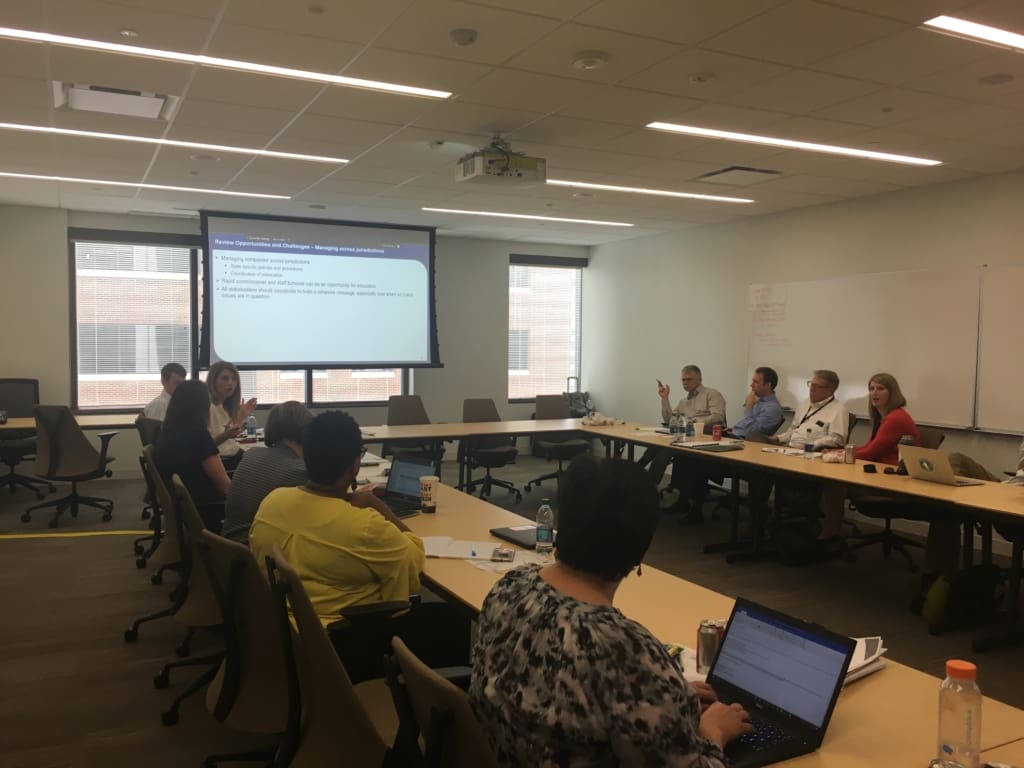
State Budget Update
The budget impasse between the General Assembly and the Governor’s office continues. This week, the spending bill that funds a handful of non-recurring items that are required in order to drawdown federal funds (H.111) is expected to be voted on by the Senate. There is some talk that Governor Cooper may veto that bill as well in an effort to force the General Assembly’s hand on Medicaid expansion. With all the back-and-forth on the budget and Medicaid, most other bills have stopped moving. Like the rest of us, they sit and wait to see what is next in this saga.
Duke Energy Carolinas Collaborative Meeting

Last week the NC Housing Coalition participated in Duke Energy’s Carolinas Collaborative Meeting, a convening of groups focused on increasing energy efficiency throughout North and South Carolina. NCHC is there as part of our work on Energy Efficiency for All (EEFA) coalition. The Coalition is one of the state partners in this national campaign dedicated to linking the energy and housing sectors together in order to tap the benefits of energy efficiency for millions of low-income families.
Home energy costs disproportionately take up a larger portion of household income compared to non low-income households. On average, low-income households spend 7.2% of their income on utility bills, more than triple the 2.3% spent by higher-income households for electricity, heating, and cooling. In North Carolina, our most energy burdened communities are located in rural counties in eastern NC. You can look up your county’s energy burden on the NCHC website.
At the Duke Collaborative meeting, we reviewed the progress of the utility company’s current programs aimed at increasing energy efficiency. As someone who previously worked on developing green building policies and managing projects going through the LEED certification process, it was great to hear about sustainability-related efforts here in the Carolinas and opportunities to expand.
Duke Energy and their partners have a variety of programs, such as rebates and grants, targeting existing buildings for energy efficiency upgrades and weatherization. What was striking in the meeting was that many of the programs are undersubscribed. Staffmembers report difficulty in finding residents to participate, particularly low-income residents, who could benefit from the cost savings. We know there is no shortage of people who could use the benefits, the challenge is making sure families are aware of their availability.
If you have any questions or information to share about your experience with energy efficiency, contact me.
NCHC Participates in NC Housing Finance Agency Congressional Briefing

For the past ten years, the North Carolina Housing Finance Agency has hosted an annual briefing for staffers of North Carolina’s Congressional delegation. The purpose of the briefing is to inform staffers about affordable housing programs, policies, and issues so that they can better understand the current housing issues facing people in their districts and to be better prepared to address specific constituent concerns. The briefing is also open to other legislative or executive staffers. This year’s briefing was held on July 19th and NCHC was pleased to participate as a presenter and resource.
Staffers from Governor Cooper’s office also attended. NCHC Executive Director, Samuel Gunter, began the informational program with an overview of the housing crisis and what is “affordable housing” in general. Attendees also heard from speakers from HUD and the finance agency who detailed the ins and outs of various housing programs available to direct individuals, local government, nonprofits and other service agencies.
Several attendees commented that they found the information useful and that the knowledge would go a long way to helping people in their districts. Staffers remarked that they are seeing increased concern about housing issues and specific constituent problems.








